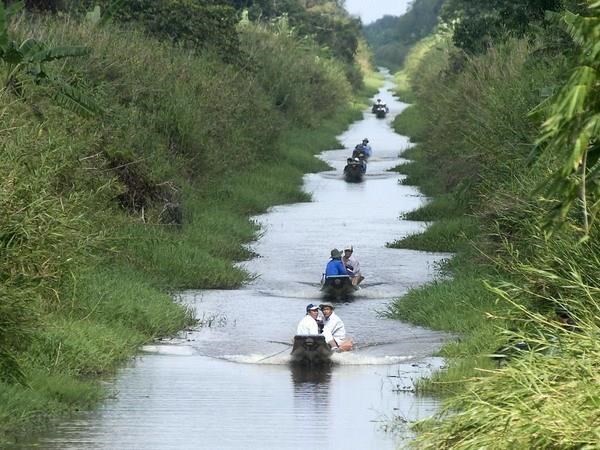
In recent years, Ca Mau has seen an annual growth of 12-14 percent in the number of tourists. In 2017, the province welcomed over 1.2 million visitors, up 61.29 percent against 2010, with tourism revenue rising 3.5 times during this period.
In 2018, Ca Mau served more than 1.4 million tourists, a rise of 16 percent year-on-year, with a revenue of 2.2 trillion VND (94.6 million USD).
Major tourism routes of the locality include Ca Mau-U Minh Ha National Park-Hon Da Bac, Ca Mau-Song Trem eco-tourism area, and Ca Mau-Mui Ca Mau National Park-Dat Mui Tourist Site.
Thanks to a developed and connected road system, the province has formed four tourist areas and 14 community-based eco-tourism sites.
In the five years since Mui Ca Mai National Park launched its community-based ecotourism service, which was supported by the Swedish International Development Cooperation Agency, local tourism has seen rapid growth.
According to Phan Quoc Khai, Director of the Mui Ca Mau National Park, the annual number of domestic visitors to the park has risen over the years to reach roughly 300,000 people in recent times.
Tran Hong Quan, Vice Chairman of the People’s Committee of Ca Mau, said that ecotourism and community-based tourism are now the major tourism products of Ca Mau. Therefore, the locality has focused on plans to preserve and develop the Mui Ca Mau mangrove forest ecotourism area and U Minh Ha National Park ecotourism area; along with the tourism sites of Hon Khoai, Hon Da Bac, and Khai Long beach.
However, insiders held that Ca Mau’s tourism industry lacks professionalism and needs to select key highlights.
Nguyen Thanh Tuyen, from the Ca Mau Tourism Promotion Centre, said that compared to other regional localities, tourism development in Ca Mau has yet to match its full potential and live up to its advantages.
The locality’s tourism products have yet to meet the demand of tourists, while tourism promotion has been ineffective.
According to the Mekong Delta Tourism Association, the number of foreign tourists travelling to Ca Mau has remained modest as out of the 2.8 million foreign tourists to the region, only 25,000 (less than 1 percent) travel to Ca Mau.
Director of the provincial Department of Culture, Sports, and Tourism Tran Hieu Hung said that localities in the province are not yet active in developing tourism products and community-based tourism models, while the transport infrastructure to tourism sites has been poor and incentives for tourism businesses has remained modest. Only 50 percent of the tourism workforce has been trained, affecting the quality of tourism services, he added.
Amidst the current situation, Quan said that in the future, the province will design a number of preferential policies to attract more investment in tourism, including those related to land use and ground clearance.
Ca Mau will encourage businesses to invest in ecotourism development in Mui Ca Mau and U Minh Ha National Parks.
Poor areas will be supported to develop infrastructure system for tourism expansion, he said.